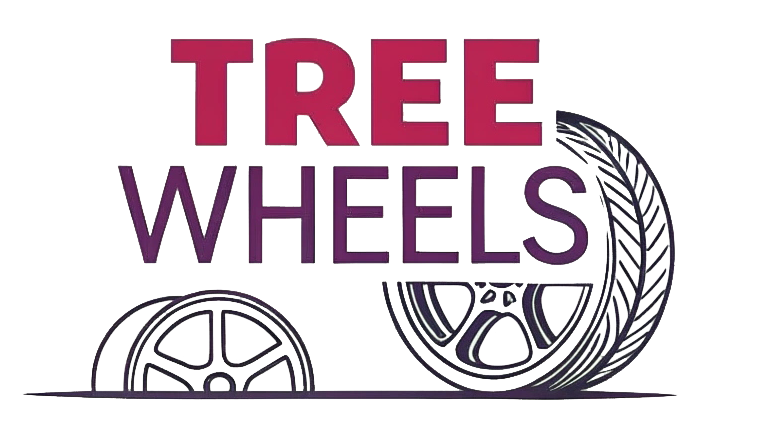Struggling with sluggish vehicle performance and poor fuel efficiency? Your stock wheels might be the hidden culprit, adding unnecessary weight that's holding your vehicle back.
Forged wheels typically save between 25-40% of weight compared to cast wheels. This reduction in unsprung mass improves acceleration, handling, and fuel efficiency. A 20-inch forged wheel often weighs 22-26 pounds versus 30-35 pounds for a comparable cast wheel.
 vs [cast wheels](https://www.youtube.com/watch?v=8UnjY2gaNIY&pp=0gcJCfcAhR29_xXO) weight comparison forged wheels weight comparison](https://treewheels.com/wp-content/uploads/2025/08/image-1-forged-wheels-vs-cast-wheels-weight-com.png)
When I started Tree Wheels, weight reduction was one of our primary goals. I've seen countless customers amazed at the difference our wheels make. The science is clear: reducing unsprung weight (components not supported by the suspension) delivers performance benefits that far exceed weight reduction elsewhere on the vehicle. Let's dive deeper into what this means for your car.
How Much Do Wheels Reduce Weight?
Are you wondering if upgrading to lightweight wheels is worth the investment? Many drivers underestimate how much those heavy stock wheels are costing them in performance.
When upgrading from stock cast wheels to performance forged wheels, you can typically reduce weight by 5-10 pounds per wheel, totaling 20-40 pounds across all four corners. This reduction in unsprung weight has a multiplier effect on performance equivalent to removing 60-120 pounds from the vehicle's body.
 wheel [weight reduction](https://www.vorteqcarbon.com/blogs/news/the-importance-of-weight-reduction-in-automotive-performance-and-racing?srsltid=AfmBOoooq3PQbFKQoX9Qnvmyipjc9n0Bz7A2rHPs49-LP1powdpXmKqg) benefits](https://treewheels.com/wp-content/uploads/2025/08/image-2-performance-benefits-of-wheel-weight-re.png)
In our testing at Tree Wheels, we've documented the exact weight differences across various wheel sizes and designs. The results consistently show significant reductions when moving from cast to forged construction. Let me break down what this means in practical terms:
Weight Reduction by Wheel Size
| Wheel Size | Average Cast Weight | Average Forged Weight | Weight Reduction | Percentage Saving |
|---|---|---|---|---|
| 18-inch | 26-28 lbs | 18-20 lbs | 6-8 lbs | 23-29% |
| 19-inch | 28-32 lbs | 19-22 lbs | 8-10 lbs | 28-31% |
| 20-inch | 30-35 lbs | 22-26 lbs | 8-11 lbs | 26-31% |
| 21-inch | 33-38 lbs | 24-28 lbs | 9-12 lbs | 27-32% |
What makes this weight reduction so important is where it occurs. During manufacturing, we apply up to 9,000 tons of pressure to premium aluminum billets, creating a dense, aligned grain structure that allows us to use less material while maintaining strength. One of our customers recently installed our forged wheels on his BMW M4 and immediately noticed sharper turn-in response, improved braking distances, and better acceleration. The physics are undeniable – every kilogram saved in wheel weight is worth approximately three kilograms in overall vehicle weight reduction when it comes to performance impact.
What Are The Disadvantages Of Forged Wheels?
Thinking about upgrading to forged wheels but wondering about the downsides? It's important to consider both the benefits and limitations before making this significant investment.
The main disadvantages of forged wheels include higher cost (typically 2-3 times more expensive than cast wheels), limited design flexibility compared to cast options, longer production times, and potential repair difficulties if damaged. However, these drawbacks are offset by superior strength, weight savings, and performance benefits.
](https://treewheels.com/wp-content/uploads/2025/08/image-3-forged-wheel-manufacturing-challenges-.png)
As someone who oversees the production of forged wheels daily, I can provide an honest assessment of their limitations. The forging process itself creates certain constraints that customers should be aware of before purchase:
Comparison of Forged vs. Cast Wheels
| Factor | Forged Wheels | Cast Wheels |
|---|---|---|
| Cost | $500-$2,000+ per wheel | $150-$400 per wheel |
| Production Time | 15-35 days depending on design | 5-10 days |
| Design Complexity | Limited by forging constraints | Highly versatile, complex designs possible |
| Customization Flexibility | Limited to certain shapes and contours | Virtually unlimited design options |
| Repair Possibility | Difficult or impossible to repair significant damage | Often repairable |
| Weight | Significantly lighter | Heavier |
| Strength | Extremely high | Moderate to good |
The manufacturing process for our forged wheels at Tree Wheels is intensive. We start with aircraft-grade aluminum billets that undergo tremendous heat and pressure to align the metal's grain structure. This process eliminates porosity but also limits certain design elements that would be easy to achieve with casting. We often work closely with customers to adapt their design visions to the realities of the forging process, sometimes making slight modifications to ensure manufacturability while preserving the aesthetic intent.
Another consideration is that when a forged wheel does sustain damage, repair options may be limited. The same density and strength that make these wheels perform better also make them more challenging to repair if bent or cracked. Most of our customers understand this trade-off and consider it worthwhile given the performance benefits and the fact that the superior strength makes damage less likely in the first place.
How Much Stronger Are Forged Wheels?
Wondering if forged wheels' strength claims are just marketing hype? I've seen the test results firsthand, and the difference in structural integrity between forged and cast wheels is dramatic.
Laboratory tests consistently show that forged wheels are 200-300% stronger than cast wheels of similar design. This superior strength allows forged wheels to withstand greater impacts, carry heavier loads, and maintain structural integrity under extreme driving conditions while using less material.
 forged wheels strength testing](https://treewheels.com/wp-content/uploads/2025/08/image-4-strength-testing-of-forged-versus-cast-.png)
At Tree Wheels, strength testing is a critical part of our quality control process. Our engineering team conducts extensive simulations and physical tests to verify the structural integrity of every wheel design we produce. The results consistently demonstrate the superior strength characteristics of forged construction:
Strength Comparison Metrics
| Test Type | Forged Wheel Performance | Cast Wheel Performance | Advantage |
|---|---|---|---|
| Impact Resistance | 30-35% higher impact energy absorption | Baseline | +30-35% |
| Fatigue Resistance | 2.5-3x more cycles before failure | Baseline | +150-200% |
| Radial Load Capacity | 40-50% higher maximum load | Baseline | +40-50% |
| Lateral Load Capacity | 35-45% higher maximum load | Baseline | +35-45% |
| Yield Strength | 2-3x higher resistance to permanent deformation | Baseline | +100-200% |
The strength difference comes from the manufacturing process itself. When we forge a wheel, we're fundamentally altering the metal's microstructure. The intense pressure (up to 9,000 tons) eliminates voids and porosity while aligning the aluminum's grain structure in ways that maximize strength. In contrast, cast wheels retain microscopic air pockets and random grain structures that create potential failure points.
This strength advantage translates directly to real-world benefits. One of our off-road clients recently reported back after a particularly challenging desert race that their wheels remained perfectly true despite multiple hard landings and impacts that had previously damaged their cast wheels. For street applications, this means greater resistance to pothole damage, better load carrying capacity, and the ability to design wheels with less material while maintaining structural integrity. The strength-to-weight ratio is simply in a different league compared to cast alternatives.
Do Forged Wheels Weigh Less?
Curious about whether the premium price of forged wheels really translates to meaningful weight savings? The data leaves little room for doubt in this crucial performance metric.
Yes, forged wheels weigh significantly less than cast wheels of equivalent size and load capacity. The forging process creates a stronger metal structure that requires less material, resulting in wheels that are typically 25-40% lighter than their cast equivalents while maintaining superior strength.
 forged wheels weight benefits](https://treewheels.com/wp-content/uploads/2025/08/image-5-weight-comparison-between-forged-and-ca.png)
At Tree Wheels, we've conducted extensive weight comparisons across our product line compared to similarly sized cast alternatives. The weight savings are substantial and consistent across all sizes and styles:
Weight Comparison by Construction Method
| Wheel Type | Construction Method | Average Weight (20") | Weight Savings |
|---|---|---|---|
| OEM Stock | Gravity Cast | 30-35 lbs | Baseline |
| Premium Cast | Low-Pressure Cast | 28-32 lbs | 6-9% |
| Flow-Formed | Cast Face/Forged Barrel | 24-28 lbs | 20-22% |
| One-Piece Forged | Fully Forged | 22-26 lbs | 26-31% |
| Advanced Forged | Forged with CNC machining | 19-22 lbs | 37-40% |
The weight reduction is achieved through multiple aspects of the forging process. When we create wheels at our facility, we start with premium aluminum billets that undergo tremendous heat and pressure transformation. This process aligns the metal's grain structure and eliminates internal porosity, creating material that is inherently stronger than cast aluminum. This superior strength-to-weight ratio allows us to use less material while achieving greater structural integrity.
I recently explained this to a customer upgrading his Porsche 911 GT3 who was concerned about preserving the vehicle's dynamic handling. After installing our forged wheels, he reported back that the car felt noticeably more responsive, with improved braking performance and quicker directional changes. The physics behind this are straightforward – reducing unsprung weight yields disproportionate performance benefits. Every gram removed from the wheels allows the suspension to respond more quickly to road inputs, improving grip, comfort, and overall driving dynamics. Additionally, the rotational inertia reduction improves acceleration and fuel economy, making forged wheels one of the most impactful performance modifications available.
Conclusion
Forged wheels offer 25-40% weight savings while delivering superior strength and performance benefits that transform your driving experience. At Tree Wheels, we craft premium forged wheels that maximize these advantages through precise engineering and meticulous craftsmanship.



